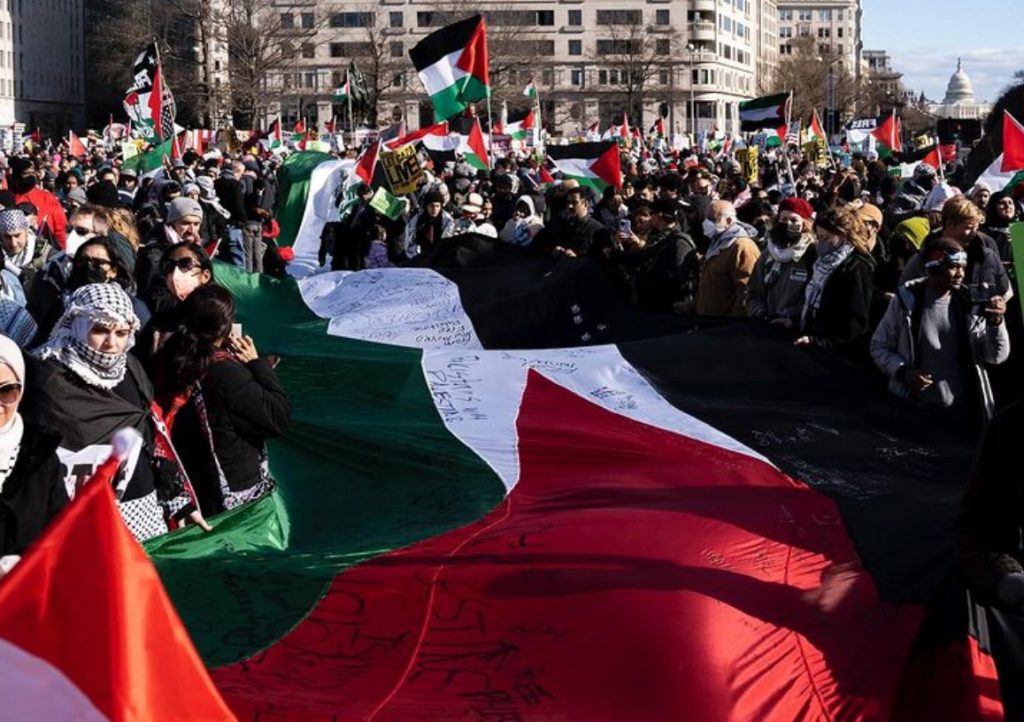Nearly four months into Israel’s genocide in Gaza, backed unconditionally by the United States, the movement for a ceasefire continues in the heart of imperialism. In major cities, street protests are still being held, and unions as well as collections of rank-and-file workers have joined the call for a ceasefire.
Israel is increasingly becoming a pariah state in the eyes of people all around the world. The hegemonic stranglehold that Zionists wielded over the Jewish community has been broken by the thousands of anti-Zionist Jews mobilizing to say “Not in our name!” All this has created a crisis for U.S. imperialism and the Biden administration, a crisis that “Genocide Joe” will not be able to easily resolve.
In response, the state and pro-Zionist institutions are applying greater measures to repress the vanguard that has been leading the movement. Even though street protests and calls for ceasefire continue, the movement is not as massive as it was in its first months. Those who have spent the past months fighting tirelessly to end the genocide are beginning to ask what more it will take to win our demands.
Here, we put forward six theses on the movement so far. Based on our participation in the movement, our analysis covers the movement’s most significant advances, the limitations we have yet to overcome, and strategic proposals on how to continue the struggle against Israel’s oppression of the Palestinian people and the imperialist system responsible for it. With these theses we aim to develop greater discussion within the movement on the way forward.
Ceasefire Now — How Far Can the Mass Demand Go?
After the Hamas-led attack on October 7, the movement for Palestine faced a difficult challenge in winning public support. Initial actions were covered as “celebrations of terrorism,” and both the U.S. government and Zionist institutions worked fast to justify Israel’s retaliation. This retaliation, however, which was broadcast in all its raw cruelty to the entire world, proved too much for many people to watch uncritically, and the movement quickly began winning greater sympathy.
It was not long before the movement united around a demand: “Ceasefire now!” The call remains a progressive demand because it requires Israel to stop its bombardment of Gaza, which has already killed over 25,000 Palestinians. It is also a demand with clear popular support beyond those active in the movement for Palestine; polling by the think tank Data for Progress shows that 60 percent of U.S. voters support a permanent ceasefire.
Even as the mainstream demand picks up support from some in the U.S. government — such as the growing list of congresspeople and city councils throughout the country — the Biden administration continues to resist calls for a ceasefire. In this context, the demand inherently deepens conflict between the Biden administration and the masses.
The demand, however, has begun to show its limits. In fact, a deeper questioning of the demand has come as a result of the temporary pause that took place over Thanksgiving weekend. While the U.S. and Israeli regimes never claimed that the pause was a ceasefire, some people hoped that it would lead to one. These hopes were quickly dashed as Israel not only resumed its offensive but escalated it, moving to South Gaza and promising to militarily occupy Gaza when the offensive is over. Even during the “pause,” Israel continued to kill Palestinians in the West Bank, and Israel has begun escalating attacks in Lebanon. With this in mind, many protests calling for an immediate ceasefire have also put forward demands to end the occupation, stop the siege, end U.S. aid to Israel, and Free Palestine.
We have from the beginning supported the movement’s fight against Israel’s genocidal counteroffensive, accompanying protests calling for a ceasefire. But we delineate ourselves from the demand because the violent oppression of Palestinians will not end until the Zionist state ceases to exist as an outpost of U.S. imperialism in the Middle East. We also take issue with the fact that a ceasefire — by its very nature — requires Palestinians to cease their own militant struggle for liberation. While we disagree with the tactics and program that groups like Hamas use to fight Israel, we do defend the basic right of Palestinians to militarily resist their oppression and fight for their liberation.
As an alternative to the demand for a ceasefire, we at Left Voice have put forward: Stop Israel’s bombing and attacks! End the siege on Gaza! End the occupation!
Genocide Joe Has Got to Go — For a Full Break with the Democrats
President Biden’s hardline Zionist position has led to a deep questioning of his administration. The movement has dubbed him “Genocide Joe,” and opponents of the bombing are increasingly promising not to vote for him in November. It is not just that Biden has sided with Israel. He is using increasingly anti-democratic measures to aid Israel’s genocide, such as bypassing Congress to provide more weapons to Israel, and vetoing UN resolutions to pause the fighting.
Biden was already polling poorly against Donald Trump, but his complicity in the genocide is causing his support to plummet among Arab voters and young voters. According to data collected by 538, Biden’s approval rating was at 38 percent in mid-December, though some polls indicate an even lower rating. Additionally, many of the Arab communities promising not to vote for Biden in 2024 are in key swing states, such as Michigan and Georgia, which Biden cannot afford to lose. There has also been increasing dissent within the administration; hundreds of staffers in Congress, the State Department, and other institutions have criticized Biden’s support for Israel and have joined the call for a ceasefire.
The bipartisan support for Israel demonstrates that the two parties of capital have no problem rejecting a demand supported by 60 percent of the country. This is not because they are simply out of touch with their base or that their constituents are not pressuring them enough. It is because Israel defends the class interests of the imperialists that make up the main class base of both the Democratic and Republican parties. The imperialist class character of these two parties is why we also continue to see bipartisan support for hundreds of billions for the military each year while we are told there is no money for education, health care, housing, livable wages, or other workers’ needs.
It is clear that Genocide Joe has to go. Beyond this, the movement needs to fight for full independence from the Democratic Party. This includes the “progressive” Democrats and the union bureaucracies, who may join calls for a ceasefire, but endorse Biden and direct the movement back into the clutch of the Democrats with their calls to vote for “the lesser evil.”
The movement must develop bodies of self-organization to carry the struggle forward separate from the Democrats. This means organizing in our workplaces and schools with a strategy for the movement that does not rely on or cede space to the misleadership of the capitalist parties.
It is important that many in the movement are seeing that the two parties of capital represent the interests of U.S. imperialism, not the working class and oppressed communities demanding an end to genocide. This shows the need for a party by and for the working class, putting forward a socialist program, grounded in class struggle. Such a party could play a powerful role, intervening in the movement for Palestine and every strike, social movement, and uprising with revolutionary ideas that advance people’s opposition to imperialism and other forms of capitalist oppression.
Anti-Zionism Is Not Antisemitism
One of the greatest crises the movement has created for the Israeli regime is that it has challenged the conflation of anti-Zionism with antisemitism. The Zionist state and its allies have long used accusations of antisemitism to delegitimize and intimidate anyone who stands with Palestine. While there have long been anti-Zionist Jews who resist this conflation, the past few months in particular have brought the existence of this now extended Jewish vanguard to mainstream attention.
This is in large part due to the powerful actions that have been organized by Jewish-led groups like Jewish Voice for Peace and IfNotNow, which use civil disobedience to popularize the slogans “Not In Our Name” and “Never Again for Anyone.” By discrediting Israel’s claims to represent all Jewish people, this anti-Zionist Jewish vanguard has created greater space for more people to speak up against Israel’s crimes without fear of being falsely labeled as antisemitic.
Additionally, there have been many Palestinian-led protests with large participation from anti-Zionist Jews. In New York City, it is common to hear “Judaism, yes! Zionism, no!” The diversity and Jewish participation in these protests shows that this is a movement uniting people of different religions, cultures, and backgrounds in a shared struggle for the Palestinian cause, not a religious conflict as it is often framed.
There is now room for Jewish people and Palestinian and Arab people to engage in more shared struggle as a way to massify the movement in the streets. This diversity of the movement also has the potential to develop the perspective of the interracial working class to unite against capitalism, which pits workers and oppressed communities against one another. Overcoming these divisions of our class is vital for furthering all struggles against imperialism, exploitation, and oppression.
Israel is not the only regime that is weakened because people are refusing to conflate a Jewish ethnostate with all Jewish people and culture. The United States has long relied on the myth of Israel as a state to protect Jews in order to maintain its imperialist interests in the region. The importance of Israel as a key ally to enforce Western imperialist interests in the Middle East cannot be understated. It is because of Israel’s importance that we see the Biden administration continuing to prop it up unconditionally even as Israel’s actions deepen domestic and international crises for U.S. stability.
The questioning of Israel as a state supposedly representing all Jews has actually led to a deeper understanding of the imperialist relationship between Israel and the United States, and it is now common to hear these connections being made with chants like “Israel bombs, USA pays! How many kids did you kill today?” along with demands to end all U.S. aid to Israel. To maintain the unity of the movement and bring even more people into the streets, it is essential to keep emphasizing opposition to Islamophobia and antisemitism and to center the solidarity among the Palestinian, Jewish, and Arab communities leading the struggle.
They Touch One of Us, We Must All Rise Up
The movement on the streets has created space for increased questioning of the Biden administration, U.S. foreign policy, and the Israeli government. Its relentless efforts to expose the atrocities taking place in Gaza, situating them in a history of colonial violence, has made it a target of the state. In an effort to prevent the truth from coming out and the growth of a movement challenging its authority and credibility, the state has begun pursuing an aggressive campaign of repression that is eerily reminiscent of McCarthyism.
It isn’t just cops in the streets who are repressing the movement. University administrations have suspended student groups like SJP, and Congress has passed resolutions that seek to equate anti-Zionism with antisemitism, censure criticisms of the Israeli government, and even pressure university administrations to implement more draconian measures. Activists have been doxed, received death threats, and harassed for their support for a ceasefire. Even university administrators have been forced to resign.
The goal of this repression is not only to silence the movement but to sever the movement from the general public, which is growing increasingly sympathetic to the cause of Palestinian liberation. The movement must fight to prevent this separation and to show people the power of the movement and its ability to take on the forces of repression. It should use this repression to expose the reality that the brutal U.S. foreign policy supporting the genocidal policies of the Israeli government is part of domestic policy, and that the U.S. government is no more “democratic” than the Israeli government.
As an example of how to fight this repression, organizers with CUNY4Palestine have put out a solidarity pledge signed by dozens of pro-Palestine organizations. This statement, along with the solidarity network built around it, unites student groups and organizations of education workers across the country in a joint initiative to fight attacks on the movement. It will be important for similar networks to be built and for the movement to coordinate nationally, and even internationally, putting forward a fight against the state’s advances against the vanguard and exposing the anti-democratic role of U.S. institutions that are attacking the movement.
Major Unions Have Joined the Calls for Ceasefire — All Labor Should Fight for Palestine
A key development in the struggle for Palestine has been the participation of labor in the movement. Recently, the SEIU, representing nearly 2 million workers, became the largest union to call for a ceasefire. An action in New York City in December brought out thousands of workers and was endorsed by various unions including the UAW, American Postal Workers Union, United Electrical, Radio and Machine Workers of America, Amazon Labor Union, and more. There have also been initiatives by rank-and-file workers like Healthcare Workers for Palestine. It is clear that this genocide is on the minds of U.S. workers, pressuring unions to take a stand.
The UAW’s call for a ceasefire was a watershed moment, given the union’s national profile and influence after its historic strike. While the bureaucracy of the union, led by Shawn Fain, recently showed the limits of their support for the movement by endorsing Biden for president, rank-and-file UAW workers are continuing to organize, showing that it is the rank and file, not the bureaucracies, that make the union and can use working-class organizations to fight not only for bread-and-butter issues, but also against oppression in solidarity with their international class siblings.
The movement must fight to push the unions who have called for a ceasefire to take action to support it. The only way to stop the assault on Gaza is for the movement globally to impose it. Given the clear relationship the union bureaucracies have with the Democratic Party, they will not call for disruptive actions in solidarity with Palestine on their own. But rank-and-file workers can use the unions and other worker organizations to lead the labor movement in solidarity with Palestine. U.S. workers make imperialism run and have a strategic power to grind it to a halt. The state will support a ceasefire only if the movement can organize enough power to impose that demand. The labor movement, using working-class methods like strikes, pickets, and walkouts, can “shut it down” and use that power to impose the movement’s demands.
From the River to Sea, What Does a Free Palestine Look Like?
Right-wing and pro-Zionist media and politicians have waged a campaign to depict the slogan “From the river to the sea, Palestine will be free!” as a call for genocide against Jews. The campaign against using the slogan has been so extreme that even the House of Representatives voted to censure Rep. Rashida Tlaib (D-MI), the only Palestinian American lawmaker in Congress.
The slogan refers to the territory between the Jordan River and the Mediterranean Sea, where Palestinians lived until the 1948 Nakba, in which the UN Partition Plan allowed the creation of the Zionist state. From the beginning, Israel, an ally of imperialism, has been a racist enclave, based on colonization and national oppression, whose constituent principle is the exclusionary Jewish character of the state.
The Nakba was characterized by widespread violence, including massacres, forced evictions, and destruction of homes and villages. Many Palestinians were killed or fled their homes in fear of violence. It displaced about 750,000 Palestinians, who became refugees. Many were forced to live in precarious refugee camps in Palestine and surrounding countries, where their ancestors continue to live today.
The debate over this slogan brings us back to the question of the state of Israel’s origins. Millions of young people are seeing how the root of the problem is linked to Zionism and imperialism, as Israel is an enclave serving its interests in the region, specifically those of the United States. It has done so throughout its history. We also cannot forget that all the occupied territories are under occupation from the river to the sea.
The slogan “From the River to the Sea, Palestine will be free!” has been used in the Palestinian struggle for decades. Many times it has been linked to the demand of a single, secular, democratic, and multiethnic state in all of the pre-partition territory of Palestine, where Arabs and Jewish people can live in peace, as they did before the imperialist offensive.
We support the fight for a Free Palestine from the River to the Sea. As historian and editor of our sister site in the Spanish State, Josefina L. Martinez, has written, “To advance the struggle for true self-determination of Palestine requires the unity of a strong international anti-imperialist movement and the revolutionary struggle of the working class in the Arab countries, together with the Palestinian people and those Jewish workers who break with Zionism. The consistent development of this struggle poses, as we have been pointing out, the construction of a workers’ and socialist Palestine, where Arabs and Jews can coexist democratically and peacefully, as part of a federation of socialist republics of the Middle East.”













